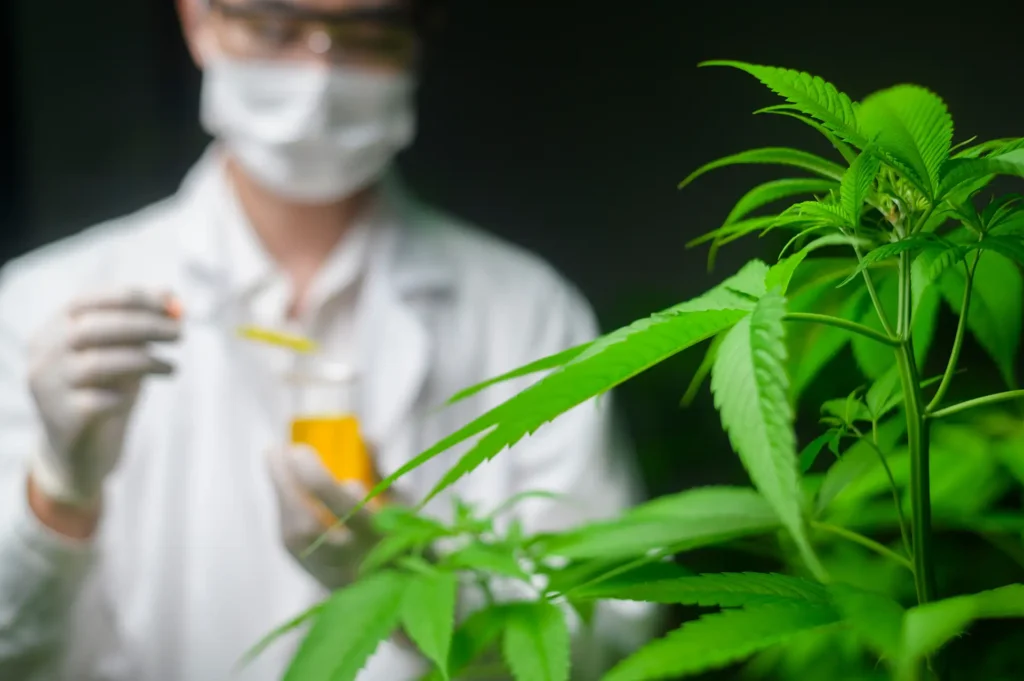For thousands of years, the Cannabis sativa L. plant has been used in various ways, from making textiles to providing food and medicine. With increasing acceptance and research, the plant’s compounds, particularly cannabinoids, are being explored for their potential therapeutic benefits to understand if they have a role in modern medical practice.
Cannabinoids and Inflammation
In the UK, medical cannabis can be prescribed for conditions like chronic pain, epilepsy, and multiple sclerosis when licensed therapies have not been successful. One area of interest is the potential of cannabinoids to reduce inflammation. While cannabidiol (CBD) has shown promise in reducing inflammation in mouse cells, and cannabidivarin (CBDV) has been observed to affect inflammatory pathways, research continues to explore other cannabinoids.
A recent study examined 47 “minor” cannabinoids to see if they could reduce inflammation in mouse cells (RAW 264.7 cells). This research aimed to broaden our understanding beyond the more commonly studied CBD and delta-9 tetrahydrocannabinol (THC).
How the Study was Conducted
Researchers used a byproduct of cannabinoid crystallization, known as mother liquor, to extract the minor cannabinoids. They then induced inflammation in the mouse cells using lipopolysaccharide (LPS). To measure the impact of the cannabinoids on inflammation, they used two tests:
- Griess Assay: This test measured nitric oxide production, a marker of inflammation.
- IL-6 ELISA: This test measured the concentration of interleukin-6 (IL-6), another key inflammatory marker.
Key Findings
- The tests confirmed that LPS successfully triggered an inflammatory response in the mouse cells.
- Many of the cannabinoid fractions didn’t show a reduction in IL-6 levels, indicating no significant anti-inflammatory effect in this experiment.
- However, some fractions (specifically 33, 41, and 49) showed lower IL-6 levels, suggesting they might have anti-inflammatory properties.
What does this mean for future research?
The study highlighted some important points for future research:
- The LPS concentration used might not have been optimal, which could have affected the results.
- Some cannabinoid fractions might contain compounds that actually increase inflammation.
Future studies should use more diluted samples and combine the IL-6 test results with mass spectrometry data to identify the specific cannabinoids that contribute to anti-inflammatory effects. Researchers suggested using a Random Forests model to help with this. This is a major limitation of this study as it is not known which cannabinoids were contributing to the different effects.
What does this mean for patients?
This research suggests that certain minor cannabinoids might have the ability to reduce inflammation in mouse cells. In contrast, other combinations of minor cannabinoids may contribute to a worsening of inflammation in this model.
The most common reason why medical cannabis is prescribed in the UK is chronic pain. This includes causes of inflammatory pain, such as arthritis and inflammatory bowel disease (IBD).
Understanding the effect minor cannabinoids and other compounds (i.e. terpenes and flavonoids) have on inflammation will be important in understanding how these medications affect the body. This is an important step in understanding whether medical cannabis is an effective and safe option for patients with all conditions, but notably those with conditions which cause activation of the immune system.
Conclusion
This study provides a valuable starting point for exploring the potential effects of minor cannabinoids on inflammation. More research is needed to fully understand their effects and potential applications. It is also important to determine the safety and effectiveness of minor cannabinoids in humans.





